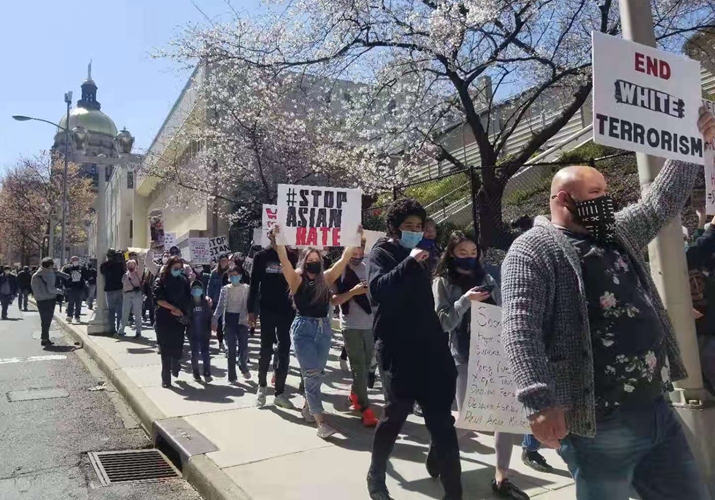But let's be clear, white supremacy, as seen in the genocide of Native Americans, the theft of Mexican lands and the kidnapping and enslavement of millions of African people, is firmly rooted in the foundation of the U.S. So it's not surprising, although horrific, that on March 16, a 21-year-old white man took it upon himself to target three Asian businesses in the Atlanta, Georgia area, drive 40 minutes between establishments, and shoot and kill eight people, including six Asian women, at point-blank range.
Anti-Asian hate goes as far back as the first wave of Asian immigrants who came to the U.S. in the 1850s and helped build the first transcontinental railroad, taking on the most dangerous jobs and getting paid 30-50 percent less than their white counterparts, according to the Chinese Railroad Workers in North America Project at Stanford University.
In what became known as the Chinese Massacre, a white mob lynched and shot 18 Chinese people in Los Angeles in 1871. No one was ultimately punished for these crimes. In 1885, another white mob killed 28 Chinese coal miners and burnt down their living quarters in Rock Springs, Wyoming, to again face no prosecution.
The Chinese Exclusion Act of 1882 helped seal the institutionalization of hate and violence against Asians in the U.S.
After the bombing of Pearl Harbor in Hawaii by Japan in 1941, the U.S. forced over 120,000 people of Japanese descent into concentration camps for the duration of World War II. Some 62 percent of those held were U.S. citizens, the New World Encyclopedia noted.
According to 2019 U.S. Census reports, there are over 20 million Asian Americans, about 5.6 percent of the population, with Chinese people making up the largest group, followed by Indian, Filipino, Vietnamese, Korean and Japanese. Asians are a growing and multi-faceted demographic and an integral part of the U.S.
The anger and shock across the country after the Atlanta mass shooting and the outpouring of support for the often invisible Asian community in the U.S. has spotlighted the rising violence against it. Asians are getting the opportunity to recount their heightened alarm and anger. Recent immigrants and U.S. born citizens alike are telling their stories of having to endure racist slurs and interactions, feeling unsafe in public places and being ignored or dismissed.
The Asian community has also been organizing against discrimination for decades, forming alliances with other groups to combat the divisive role racism plays in the U.S. "Our approach recognizes that in order to effectively address anti-Asian racism we must work to end all forms of structural racism leveled at Black, Indigenous, and other communities of color (in the U.S.)," Stop AAPI Hate states on its website.
Moreover, multi-ethnic groups, such as Compassion in Oakland, California, have sprung up in major cities to protect Asian seniors. The group has over 1,000 volunteers signing up to chaperone the elderly, especially in Oakland's Chinatown.
There has also been a growing movement of Asian pride. Prominent actress Sandra Oh, of Korean descent, led a crowd at a Stop Asian Hate rally in Pittsburgh, Pennsylvania in the chant, "I am proud to be Asian! I belong here!"
To beat back anti-Asian hate, a strong, visible and proud Asian community that can feature its diversity of rich cultures and languages must be allowed to flourish without the fear of intimidation, assault or murder. And it is up to the rest of us to stand up and defend it.















